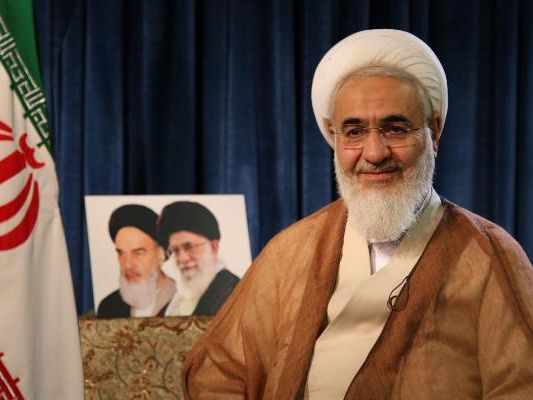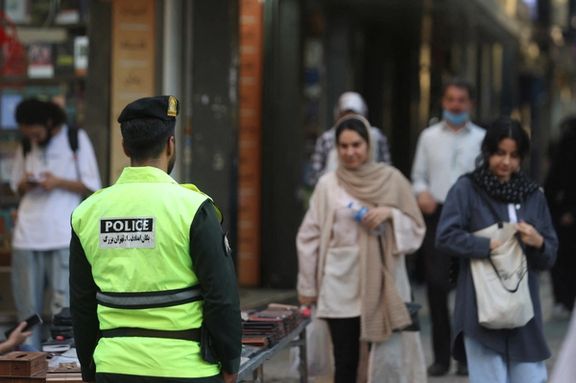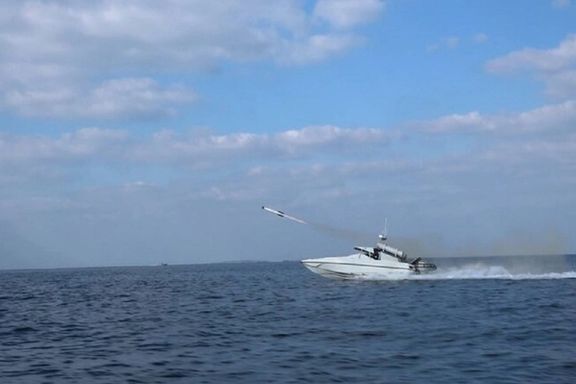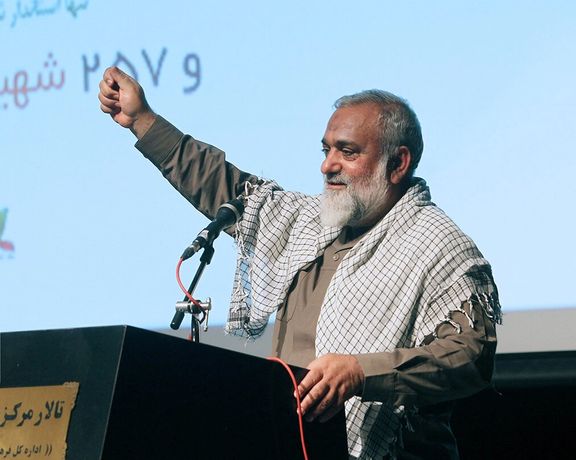God punishing America's rulers through LA fires, Khamenei's representative says

A representative of Iran's Supreme Leader Ali Khamenei says the devastating fires in Los Angeles, California, are God's punishment for American rulers.

A representative of Iran's Supreme Leader Ali Khamenei says the devastating fires in Los Angeles, California, are God's punishment for American rulers.
"We express our sorrow for the people (of Los Angeles) but this sorrow is for the people, and the US rulers should know that God is punishing them, and this might be a prelude to the destruction of their palace of oppression and corruption," said Khamenei's representative in Qazvin Abdolkarim Abedini.

Iran's government faced widespread criticism at the 48th Session of the Universal Periodic Review (UPR) in Geneva over its treatment of women and girls, use of capital punishment and suppression of dissent.
The UPR is a mechanism of the UN Human Rights Council which reviews the human rights records of all member states every 4.5 years. Iran underwent its fourth review on Friday after previous assessments in 2010, 2014, and 2019.
The United Kingdom’s representative expressed concern about Tehran's record, describing the government's "violent enforcement of mandatory dress codes, intimidation of journalists and human rights defenders, and discrimination against minority groups".
In its recommendation, the UK said Tehran needs to "guarantee fair trials for all individuals, especially those facing the death penalty", provide access to lawyers of their choice and ratify the UN Convention against Torture.
The representative also urged the Islamic Republic to "grant access to UN human rights officials, including the Special Rapporteur on Iran".
Iran's Deputy Foreign Minister Kazem Gharibabadi described to the session what he saw as progress in the country’s human rights record.
"Substantial investments have been made to improve the lives of the Iranian people, yielding significant progress," he said.
During and after the 2022 nationwide protests, human rights groups have reported violent crackdowns on protests, arbitrary arrests, and repression of dissent, particularly targeting women.
Sweden’s representative said it was "deeply concerned about the human rights situation in the Islamic Republic of Iran, including the situation for women and girls and the widespread use of the death penalty".
They recommended that Iran "introduce a moratorium on the death penalty, including for juvenile offenders, with a view towards abolition". Sweden also called on Iran to "eliminate in law and practice all forms of systematic discrimination against women and girls" and "release all arbitrarily detained individuals".
Switzerland voiced similar concerns, urging Iran to "reduce the number of crimes punishable by the death penalty and establish a moratorium on its use, particularly for minors and drug-related offenses".
The Swiss delegation called for Iran to "disband the morality police and put an end to restrictions on women and girls". Additionally, Switzerland urged Iran to "take the necessary measures to combat discrimination against ethnic and religious minorities and remedy socio-economic inequalities in provinces populated by these minorities".
At the outset of the session, Iran's Gharibabadi said sanctions were the obstacle to the country's development and prosperity. "The people of my country are victims of aggression due to an economic assault," he stated.
Ukraine criticizes Iran’s role in Russia’s war
Ukraine singled out Iran for its support of Russia in its full-scaled invasion of Ukraine, accusing Tehran of enabling war crimes through the provision of drones and missiles.
"As long as Iranian drones and missiles continue to kill innocent civilians and destroy civilian infrastructure, Iran bears full responsibility for enabling Russia’s war crimes in Ukraine," the Ukrainian representative said.
Ukraine called on Iran to "accept all outstanding visit requests from UN special procedures without hindrance or restriction" and to align its domestic legislation with international human rights standards. The representative added that Iran’s actions were a violation of "international humanitarian and human rights laws".
Last year, Ukraine’s Prosecutor General Andriy Kostin announced a case against Islamic Revolutionary Guard Corps Brigadier General Abbas Mousavi Sharifi Mollasaraei for allegedly aiding Russia and committing war crimes in Ukraine.
Since late 2022, Russia has used Iranian-made Shahed-136 and 131 kamikaze drones, as well as Mohajer-6 drones, in its war in Ukraine. The Iranian government initially denied supplying drones to Russia but later said the deliveries took place before the war began.

Iranian authorities say two girls were detained by police, after they recorded themselves dancing at a Tehran monument honoring those who died in the Iran-Iraq war.
The video, which has gone viral online, features the two girls, dressed in jeans, purportedly dancing at the "Monument to the Unknown Martyrs of the Sacred Defence" in Tehran.
Authorities have criticized their attire as "inappropriate" and have since blocked both girls' Instagram accounts.
Since the 1979 Islamic Revolution, dancing has been officially prohibited in Iran, with clerics condemning it as a "sinful act" and "an act of lust." Acts of self-expression are also heavily policed.
During the 2022 nationwide anti-government protests in Iran, young girls played a central role in the demonstrations. Videos showed schoolgirls tearing up textbooks depicting the Supreme Leaders of the Islamic Republic. In another display of dissent, young Iranians filmed themselves knocking turbans off clerics' heads, to show their rejection of the Islamic Republic's rule.
Last September, Iranian authorities took legal action against actress Sahar Dolatshahi for allegedly "dancing" in a scene in the television drama series Dariush.
Despite stringent regulations, many Iranians persist in practicing cultural traditions like ethnic dance, which the government describes as "rhythmic movements" to sidestep the term "dance."

Ships in the northern Persian Gulf have reported receiving repeated radio communications, including instructions to alter their course, which the UK Maritime Trade Operations (UKMTO) says could be linked to an ongoing Iranian military exercise.
The UKMTO, which oversees maritime security in the region, cautioned seafarers that vessels near Iranian waters could encounter similar VHF communications—radio messages sent on very high frequencies—during the Islamic Revolutionary Guard Corps' (IRGC) drills.
A commander of the IRGC Navy, Rear Admiral Alireza Tangsiri, described the "Great Prophet 19" drills on Friday as "a message of peace and friendship for neighbouring countries" adding, "We are capable of ensuring the security of the sensitive Persian Gulf region together with neighbouring nations and standing firmly against any threats."
Tangsiri said the exercise carries a message for "non-regional countries," asserting that "their presence disrupts security in the region" and that "they cannot create lasting stability in this critical area." He explained that the drills aim to strengthen the security of international waterways, focusing on the safety of shipping and economic activities in the region.
Iranian media reported that the drill features new technologies, including vessels with speeds of 75 and 90 knots capable of launching missiles and deploying advanced mines.
Tangsiri said that adversaries of Iran "should know that we will stand against their bullying with strength and courage" and that any hostile plans "will be thwarted decisively."

The resignation of Israel’s military chief has drawn reactions from senior leaders of the Islamic Revolutionary Guard Corps (IRGC), who framed it as a weakening of the Israeli government after October 7.
Lt. Gen. Herzi Halevi, who announced on Tuesday his intention to step down on March 6, admitted responsibility for the security lapse during Hamas's cross-border attack on October 7, 2023, which marked the start of the conflict.
The Commander-in-Chief of the IRGC, Hossein Salami, described the resignation as "a clear sign of the Zionists' defeat in the Gaza war."
"When Gaza achieved victory, it means Islam achieved victory. This resistance is an inspiration for Muslims," Salami said on Thursday.
The Deputy Coordinator of the IRGC, Mohammadreza Naghdi, linked the resignation to what he described as broader challenges facing the Israeli government, asserting that resistance movements—Tehran's term for its proxy militias across the region—had significantly weakened its position.
“The Zionist regime, which considered itself the most powerful country in the region, is now collapsing in the face of the resistance of nations,” Naghdi said.
Over recent weeks, analysts and experts have contended that it is Tehran's “Axis of Resistance” that has been significantly weakened, pointing to the collapse of Bashar al-Assad's rule in Syria and the heavy losses sustained by Hezbollah and Hamas in recent military conflicts with Israel.
In his resignation letter to Israel’s defense minister, Lt. Gen. Halevi acknowledged that the Israel Defense Forces (IDF) had “failed in its mission to protect the citizens of Israel” during the deadly attack by Hamas.
“My responsibility for the terrible failure accompanies me every day, every hour, and will be so for the rest of my life,” he wrote.
The October 7 attack by Hamas, an Iran-backed militant group, involved gunmen breaching Israel's border from Gaza and led to one of the most devastating wars in the region in recent memory, with over 1,400 people killed and more than 200 taken hostage.

The European Parliament adopted a resolution on Thursday condemning what it called Iran's systematic human rights abuses, highlighting the use of the death penalty against Kurdish activists Pakhshan Azizi and Varisheh Moradi.
Azizi and Moradi were sentenced to death for “armed rebellion against the state” after what the resolution described as “unfair trials” involving “torture and solitary confinement.”
The European Parliament demanded their immediate and unconditional release, along with at least 56 other political prisoners on death row in Iran.
The resolution passed with overwhelming support, receiving 556 votes in favor, six against, and 42 abstentions.
The resolution also criticized Iran's use of so-called hostage diplomacy, highlighting the arbitrary detention of EU nationals, including Olivier Grondeau, Cecile Kohler, Jacques Paris and Ahmadreza Djalali. It called for their immediate release, saying that these detentions violate international norms and fair trial rights.
The European Parliament also condemned the death in custody of Iranian-German activist Jamshid Sharmahd, urging Iranian authorities to provide transparency regarding the circumstances of his death and to return his remains to his family.